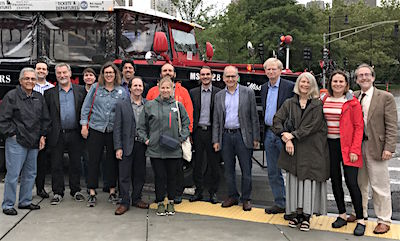SPH Hosts Meeting of Addiction Journal Editors.

The International Society of Addiction Journal Editors (ISAJE) held its 2017 meeting at Boston Medical Center (BMC) from July 12 to 14, hosted by the School of Public Health.
Founded in 2001, ISAJE is made up of editors and staff representing approximately half of all peer-reviewed journals that publish articles on alcohol, drugs, tobacco, gambling, and other behavioral addictions.
The society provides support and guidance for journal editors and staff, as well as authors and reviewers, working in the addiction field, from guidelines to avoid stigmatizing language to larger issues around journal publication quality standards. ISAJE promulgates the Farmington Consensus, which sets out standards on issues including confidentiality of peer review, qualification of editors and reviewers, and transparency of conflicts of interest.
The meeting began with an evening reception at the home of Dean Sandro Galea. Galea welcomed participants with Richard Saitz, professor of community health sciences and vice president of ISAJE, and with Michael Botticelli, director of the Grayken Center for Addiction Medicine at BMC and former director of the White House Office of National Drug Control Policy during the Obama administration. Faculty and staff from the Department of Community Health Sciences also attended the reception, mingling and networking with ISAJE members from around the world.
The morning after the welcome reception, Saitz and Michal Miovsky, the ISAJE president, kicked off the meeting at BMC. Publishers, librarians, and others joined ISAJE members to discuss topics including data sharing and open-access publishing, how libraries choose which journals to subscribe to, and how to maintain quality standards in the age of fake “journals” and predatory publishing.
The meeting also included a second social evening, including a duck boat tour of Boston.
“BU faculty are well-connected to leading scientific journals, as authors, peer reviewers, and editors,” Saitz says. “We have particular strength in addiction science publishing, so it made sense to host this meeting so we can continue to lead in the production and dissemination of high-quality research in the field, holding ourselves and others to the highest standards.”